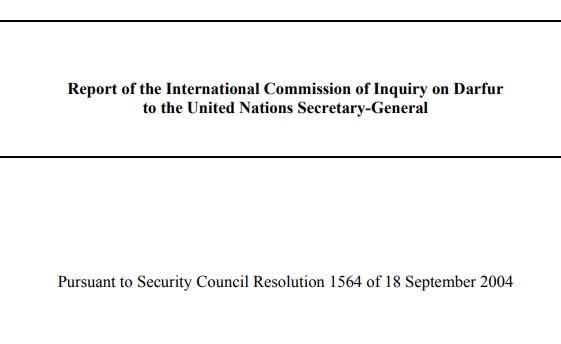513. Was there a genocidal intent? Some elements emerging from the facts including the scale of atrocities and the systematic nature of the attacks, killing, displacement and rape, as well as racially motivated statements by perpetrators that have targeted members of the African tribes only, could be indicative of the genocidal intent. However, there are other more indicative elements that show the lack of genocidal intent. The fact that in a number of villages attacked and burned by both militias and Government forces the attackers refrained from exterminating the whole population that had not fled, but instead selectively killed groups of young men, is an important element. A telling example is the attack of 22 January 2004 on Wadi Saleh, a group of 25 villages inhabited by about 11 000 Fur. According to credible accounts of eye witnesses questioned by the Commission, after occupying the villages the Government Commissioner and the leader of the Arab militias that had participated in the attack and burning, gathered all those who had survived or had not managed to escape into a large area. Using a microphone they selected 15 persons (whose name they read from a written list), as well as 7 omdas, and executed them on the spot. They then sent all elderly men, all boys, many men and all women to a nearby village, where they held them for some time, whereas they executed 205 young villagers, who they asserted were rebels (Torabora). According to male witnesses interviewed by the Commission and who were among the survivors, about 800 persons were not killed (most young men of those spared by the attackers were detained for some time in the Mukjar prison).514. This case clearly shows that the intent of the attackers was not to destroy an ethnic group as such, or part of the group. Instead, the intention was to murder all those men they considered as rebels, as well as forcibly expel the whole population so as to vacate the villages and prevent rebels from hiding among, or getting support from, the local population.515. Another element that tends to show the Sudanese Government’s lack of genocidal intent can be seen in the fact that persons forcibly dislodged from their villages are collected in IDP camps. In other words, the populations surviving attacks on villages are not killed outright, so as to eradicate the group; they are rather forced to abandon their homes and live together in areas selected by the Government. While this attitude of the Sudanese Government may be held to be in breach of international legal standards on human rights and international criminal law rules, it is not indicative of any intent to annihilate the group. This is all the more true because the living conditions in those camps, although open to strong criticism on many grounds, do not seem to be calculated to bring about the extinction of the ethnic group to which the IDPs belong. Suffice it to note that the Government of Sudan generally allows humanitarian organizations to help the population in camps by providing food, clean water, medicines and logistical assistance (construction of hospitals, cooking facilities, latrines, etc.)516. Another element that tends to show the lack of genocidal intent is the fact that in contrast with other instances described above, in a number of instances villages with a mixed composition (African and Arab tribes) have not been attacked. This for instance holds true for the village of Abaata (north-east of Zelingei, in Western Darfur), consisting of Zaghawa and members of Arab tribes.517. Furthermore, it has been reported by a reliable source that one inhabitant of the Jabir Village (situated about 150 km from Abu Shouk Camp) was among the victims of an attack carried out by Janjaweed on 16 March 2004 on the village. He stated that he did not resist when the attackers took 200 camels from him, although they beat him up with the butt of their guns. Instead, prior to his beating, his young brother, who possessed only one camel, had resisted when the attackers had tried to take his camel, and had been shot dead. Clearly, in this instance the special intent to kill a member of a group to destroy the group as such was lacking, the murder being only motivated by the desire to appropriate cattle belonging to the inhabitants of the village. Irrespective of the motive, had the attackers’ intent been to annihilate the group, they would not have spared one of the brothers.
When describing attacks, refugees often referred to GOS soldiers and Jingaweit militias as a unified group; as one refugee stated, "The soldiers and Jingaweit, always they are together." The primary victims have been non-Arab residents of Darfur. Numerous credible reports corroborate the use of racial and ethnic epithets by both the Jingaweit and GOS military personnel; "Kill the slaves; Kill the slaves!" and "We have orders to kill all the blacks" are common. One refugee reported a militia member stating, "We kill all blacks and even kill our cattle when they have black calves."
|
Or order from your favorite bookseller, using ISBN 9798985708424. Read all about it here! |

|

 Elder of Ziyon
Elder of Ziyon























